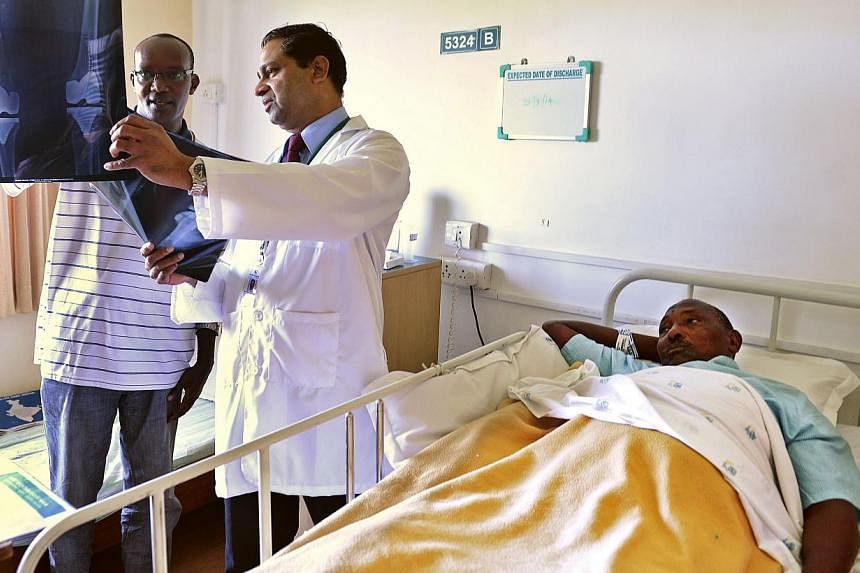In 2008, in the last such study available, Transparency International confirmed the personal experience of millions of Indians, namely, that health care is the most corrupt institution that they encounter in their daily lives, after the police.
It found that 80 per cent of Indians classified as impoverished had to pay bribes for health services. These included a hospital bed, a test, outpatient treatment or surgery. Ninety per cent of the bribes were paid directly to doctors and staff.
Dinner-table talk among the middle class and rich Indians often turns to horror stories of doctors getting kickbacks in return for an expensive operation or diagnostic procedure. Or of highly paid doctors in private hospitals given "quotas" by the management. The alleged quotas refer to the number of patients, tests and procedures they need to prescribe to generate the required revenue for the hospital.
Now an Australian doctor, Dr David Berger, has stirred up a national debate about corruption in Indian health care with an article in the British Medical Journal.
Based on six months as a volunteer physician in an Indian hospital, Dr Berger describes unnecessary X-Rays, CT scans, MRIs, hysterectomies and stent procedures, routine bribe-taking, and "needless deaths".
He mentions how reference for an electrocardiogram (ECG) at a private heart clinic or other investigations attracted a 10 to 15 per cent kickback, and how patients with no structural heart disease were being given unnecessary echocardiograms every three months.
Dr Berger's claim of doctors over-testing and over-treating has been supported by many eminent physicians. To name only one, top Indian gastroenterologist Dr Samiran Nundy, said on July 4 that "kickbacks and bribes oil every part of the health-care machinery".
If India now has a gigantic problem, the reasons are numerous. They include greedy doctors and the overall tolerance for corruption in a culture that has rationalised the giving and taking of bribes. Another reason is the reliance on self-regulation.
The Indian Medical Council (IMC) is the only body responsible for regulating doctors. Sadly, it has been ineffective. Some doctors who have reported corrupt colleagues to the IMC's ethics committee have complained publicly about its failure to act.
The council has not even managed to deal with the problem of quackery, or the fact that some medical students pay bribes to ensure that they are admitted into medical college. It does not keep statistics on how many doctors are struck off in any given year either.
Fortunately, the British Medical Journal has launched an international campaign against corruption in health care which will begin by focusing on India.
Honest Indian doctors and citizens must press the government to provide regulatory oversight, based on legislation. Without effective regulation, no accountability is possible and without accountability, there can be no punishment for those who break the rules.
Quality of care and patient safety are inevitably going to be compromised when the lack of regulatory oversight allows unscrupulous doctors to obtain positions of power and engage in corrupt practices.
Improved regulation must be backed up by administrative enforcement. Professional and ethical standards also need to be codified, along with the principles of treatment.
Dr N. Subramanian, senior consultant in urology at the Apollo Hospital in New Delhi, believes that clear guidelines for doctors on testing and treatment will provide a vital framework.
Having worked in the United Kingdom, Dr Subramanian has seen the effectiveness of such guidelines, often very simple ones such as those for patients brought into casualty with a head injury. Doctors know they need not order a CT scan, unless the patient has lost consciousness, is bleeding from the ear or nose, is vomiting or a gash is visible.
The computerisation of medical records would also help prevent unnecessary treatment because the patient's entire history of symptoms, investigations and tests would be available, making it easier to gauge whether the procedure that has been prescribed is in fact appropriate.
A national watchdog would also be useful. This would function as a place where patients and relatives can go for expert advice, or where people can report bribe-taking and unethical behaviour by a doctor.
To be fair, doctors sometimes order tests as a defensive medical practice. Such investigations are done because the patient may later ask why such and such a test was not carried out when it was available and might have aided the diagnosis.
With clear guidelines in place, such doctors would be protected against unwarranted legal action by patients.
A start has already been made to clean the Augean stables. Last month, senior cardiologists in the Indian capital launched an organisation called the Society for Less Investigative Medicine. Its aim is to challenge the tendency towards inordinate investigations. Other medical disciplines could follow suit.
But the wider point to be made is that doctors are a part of a society steeped in corruption. They are not an island. If Indians think the medical profession can be honest in a culture pervaded by dishonesty, they are deluding themselves.
The writer, a former BBC journalist, is a freelance journalist based in New Delhi.

